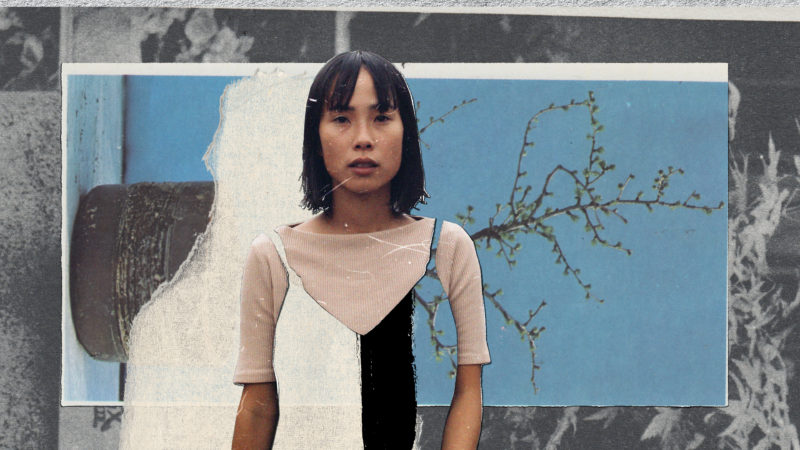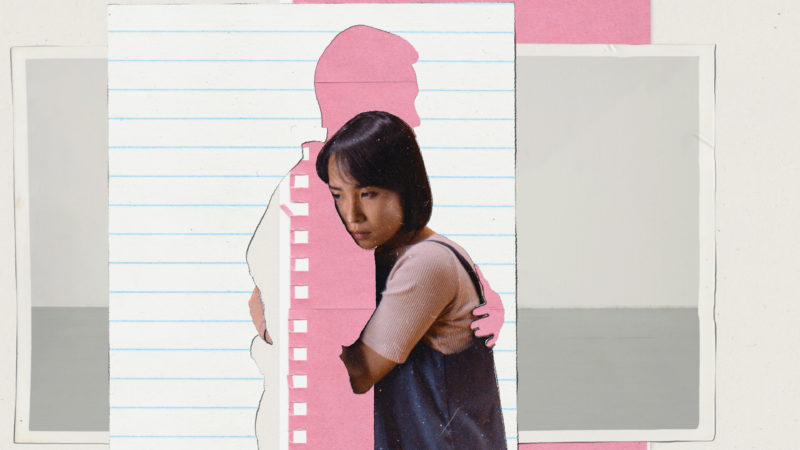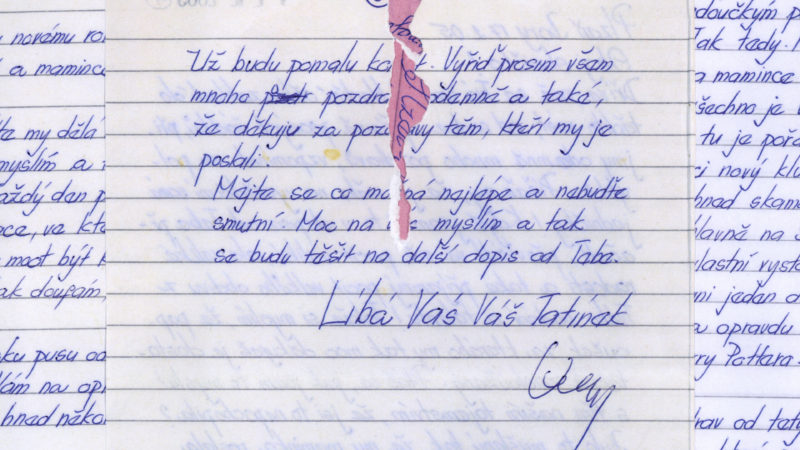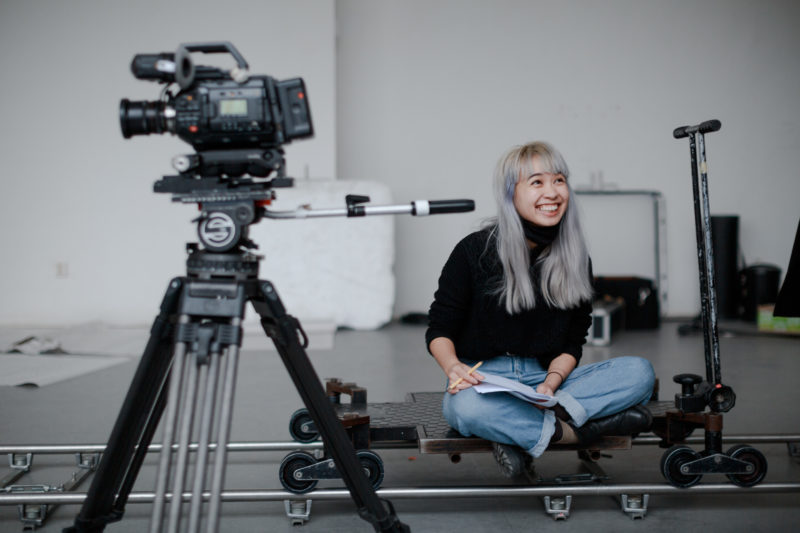
Czech-Vietnamese director Diana Cam Van Nguyen‘s short animated documentary film “Love, Dad” explores the ties and gaps between a child and a parent. The emerging director, already much-lauded, studied in animation master programme at FAMU in Prague, where she began work on the film. Centered on the letters her father sent from jail, Nguyen’s film is about “losing connection with my father and me trying to win it back,” says Nguyen. “In the past, me and my dad were separated by prison bars, these days, we are separated again, but emotionally this time.” Through a very particular story, Nguyen reveals a narrative children of the Vietnamese diaspora can relate to and appreciate.
In this interview, May Ngo talks with Nguyen about the process of making “Love, Dad,” the process of filmmaking, and growing up Czech-Vietnamese.
~
May Ngo: What was the inspiration for this particular film?
Diana Cam Van Nguyen: I had to do it because it’s my graduation film. I studied at FAMU, which is a film school in Prague, in the animation department. Before this film I also did two other short films, which were also animated documentaries.
When I knew that I had to do a graduation film, I had this idea because I found these letters from my father that I was keeping all the time, but didn’t remember that I had them. So when I read them again, I just noticed that there were so many feelings and so much love that I don’t see from my father anymore, so I had the idea that maybe I could do a film about it.
But the development of the script took about one year and a half, because I don’t think I was prepared to do such a film. But I had to do it because of the graduation task of the school. If someone did not push me to do it, I would not do it now. I didn’t have any other ideas, so I just had to concentrate on this topic and be really involved in my feelings and be prepared about what I wanted to say in this film.
May: What was it that you weren’t prepared for? Was it the very personal nature of the film that was challenging?
Diana: Yes, in the beginning I thought the idea was really nice. But I really felt I had to do it because I had some deadline for my graduation film. If I didn’t have a deadline I think maybe I wouldn’t do the film now. I would maybe take some more time or something.
But it was really good that it pushed me actually, I’m glad it happened like that. Also, the first script of this film looked so different, it was more about when my father was in prison and more like a film for children. And then, during development when we visited some workshops for animators and there were a lot of professional people from the industry from all over Europe, we had some consultations about the script and it became more obvious that I didn’t have a problem with my dad because he was in prison but because of something else.
So, at that time, it was already half a year after the first version, and I just had to start again and I started with the letters from my father.
May: Were your family involved in the development of your film at all? Did you talk to them, consult them?

Diana: No, not at all. My dad knows that I was doing a film about him, but he was prepared for it to be like the first script, when he was in prison. He didn’t know that it changed and that it was more personal. So I had a big consultation and discussion with other people but not with my family.
May: Have they seen the whole film now?
Diana: My father saw it, but not anyone else. The film is a festival film so we don’t have any online screenings. And my mum is living with my sister in Vietnam, so when it’s not going to be in any festivals in Vietnam they are not going to see it. And also, which is one more problem that we have, the subtitles are in English and we have to do the subtitles in Vietnamese, too.
May: Were you worried about how your father would respond to the film?
Diana: Yes, of course. During the development, I was pretty sure that I wanted to show him, I was really convinced that I would do the right thing. But when we started production, I was more and more nervous when the time came closer that he would see it.
I was nervous. I sometimes felt it was too hard, what I was saying in the film. I had the idea that maybe I had to change it, because I was thinking about my dad. But then I had to realise that I’m doing the film for an audience and not just for my dad, so we kept it. But my anger and this kind of stuff at the beginning, really changed and I was so much more calm.
And then I showed it to my father, he was the first viewer of the film, which we knew the whole time that it had to be like that, before some premiere or something. His reaction was like, OK. I was really worried that he would be angry with me, that I bring such a personal topic to the public, like family issues. He was OK with that, and he didn’t comment anything on the topic actually, he was commenting on the film in general, asking how much the film cost or how I found the actors, but he really didn’t talk about his feelings. I was really pushing him to tell me if he was OK with it. But I was OK with this reaction because I thought he was going to be angry, and he wasn’t. I’m glad that he knows about my feelings, about how I feel (through the film).
Love, Dad (2021) Trailer from Diana Cam Van Nguyen on Vimeo.
May: Yes, in a way the film was a letter back to your dad.
Diana: Yes.
May: I wanted to ask you a question about language, because I found it interesting that his letters were in Czech. Do you speak to your dad in Czech or in Vietnamese?
Diana: We do both. But he has to write his letters in Czech, because I can’t write or read in Vietnamese. But I can speak it.
When he was in prison and he wanted to write to me, he had to write in Czech.He can speak Czech. Not as fluently as me, and you can hear his accent, but for first generation I think he’s really good at Czech.
May: Can I ask you when he came to the Czech Republic and in what circumstances?
Diana: Yes, it was in 1985. Czechoslovakia at that time was still a Communist regime, which was the same for Vietnam. They had this agreement that Vietnam would send people to work in the Czech factories because over here they didn’t have enough human labour, a workforce.
May: Manual labourers, mostly?
Diana: Yes, so my dad was one of them, my mum also.
May: What did they do, what did they work in when they came here?
Diana: My mum was in a textile factory, and my dad was learning something, I’ve forgotten. He worked in a factory, but he was also learning something…Sorry, I can’t remember.
May: That’s OK. It’s such an interesting part of Czech history. Were there a lot of people coming from Vietnam, or was he part of a small group?
Diana: No, there were a lot Vietnamese people who came like this, at 17- or 18- years old. This was actually the first generation that stayed in the Czech Republic, and that’s how their market stand businesses started here. When Czechoslovakia had the Velvet Revolution and the Communist regime was no more, Vietnamese people stayed here and had to start their own businesses, had to do something so that’s how the markets at the borders started. I don’t know if you heard about it. These markets on the borders of the Czech Republic and Vietnamese people were doing it.
May: And did they set up the markets on the border because they saw a need? Why did they choose the borders in particular?
Diana: I’m not sure about this, but the markets at the borders still exist even now, but it’s not so popular anymore, and their customers are Germans and Polish It’s not Czech people who would travel to the borders for it, it’s the neighbouring countries who are their customers.
May: So I guess both your parents stayed on in the Czech Republic?
Diana: Yes.
May: You grew up in the Czech Republic as part of the second generation, what was the experience like, It’s a big question, I guess do you see yourself as Czech, or Czech-Vietnamese or neither?

Diana: I really don’t like this question much. It’s really hard to choose but I think it’s more Czech-Vietnamese if I can say it like this. I definitely want to spend my time in the Czech Republic, I don’t want to move to Vietnam. I also think I think more like a Czech, but I also feel a lot like Vietnamese, because I look Vietnamese and I can never be Czech, you know. Czech people will not recognise me as Czech, and yeah…so it’s like both and mixed feelings actually.
May: Especially being a Czech-Vietnamese artist. Are there a lot of Czech-Vietnamese or even Czech-Asian artists here?
Diana: Artists in general, I think there are some. There’s not a lot of us. But there’s like one singer, there are some photographers, also one director like me. It’s not lots of us, like ten of us or something. We all know each other because it’s a really small world, but there are some and I think it’s growing. I can see that because I’m from the first. There are more younger and younger Czech-Vietnamese who want to do art, and it was not that usual in my case, with my generation.
May: And what is it that drew you to film and film studies, and what did you family think of it when you chose it?
Diana: My case is really not the stereotype at all. My parents wanted me to study law or medicine, of course. But from the beginning, from childhood I was going to piano class and I drew a lot. I did ballet and this kind of stuff, because my parents wanted me to do this. When I found myself more in art and performing arts, they really just believed me and let me do it. Even though, I think they have a little bit of another imagination about my future, they felt when I already finished university and when I had a master’s degree, then I’m super OK with life, and I will have a proper job. Which is really not the case when you do art school, so this was a little bit hard, but it was never hard for them that I chose this direction.

May: And what is it about film that made you want to study it and do it?
Diana: I’m really not sure why I chose it. Before that, I studied art at high school, I was good in drawing, that’s why it came to my mind that maybe I can try animation. But it’s a little bit random. I just applied to this school and they accepted me, and from that time I’m just learning all the time. I didn’t do film before. It was a really big lesson and luck for me to…everything I know I learnt in the school.
May: What do you want to do in the future?
Diana: That’s a really, really hard question. I just finished school, like two months ago, so everyone is asking me now. I would like to be a director in my life, and do just my stuff but I know its not possible to not do commissioned work and do commercials. Now I’m writing a script for a new film, and it should be a feature, but it’s going to take a long time. So now I’m just like freelancing, doing stuff for other people, but I would like to do my own stuff.
May: Is it hard to get a film financed here?
Diana: I’m not sure funding is really hard to get. My experience was that it was easy actually for me to get. They look a lot at your CV, to your track record, what you have done before, and what was the success of the film before and in my case it just happened that it went well so they just believed in my future projects. But I think it’s really hard when someone who doesn’t do film at all tries to get funding, and nobody knows their name yet. But when you already have some name and they know about it, it’s actually easier to get it.
May: I do hope you get to make your feature film one day, because I’ve watched a few Czech films and it’s not really diverse.
Diana: I completely agree. I really think it would help Czech cinema in general, but the question is if the audience will actually go to see these films, you know. Because the Czech audience…so…
May: Why wouldn’t they, do you think?
Diana: Czech audiences are used to some types of comedies and this type of film. Even art films, more like arthouse, it’s doesn’t have such a big audience. It’s not because the director is not Czech, the director is Czech, but you can see in numbers that it’s not that popular. I don’t know why, they are not watching these more art films.
I don’t think it’s because I am Asian and a woman, but it’s more that they are used to some types of film which are genre films…
May: And yours is not like that kind of film?
Diana: Yes, mine is more like independent, I would say
May: Is there a strong independent film scene in the CR?
Diana: Yes, I think there is starting to be, but the numbers of attendance is not really high.
May: Is that due to COVID, or even before?
Diana: COVID just made it worse, but even before the numbers were low.
May: So your film is doing the festival circuit right now, where will it go next?
Diana: It’s been in like 35 festivals already, and we have lots ahead, like 15 ahead. But this festival circuit is going to take one or two years and we had a premiere in August, so it’s been just five months. So it’s going to still be running for another year.
Contributor’s Bio
 May Ngo is a freelance writer and editor. She received the Kill Your Darlings New Critic Award 2021 and Sydney Review of Books Juncture Fellowship 2021. She writes essays, reviews, audio drama and fiction: mayngo.net
May Ngo is a freelance writer and editor. She received the Kill Your Darlings New Critic Award 2021 and Sydney Review of Books Juncture Fellowship 2021. She writes essays, reviews, audio drama and fiction: mayngo.net


